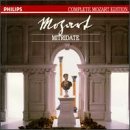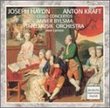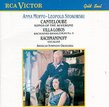| All Artists: Wolfgang Amadeus Mozart, Leopold Hager, Arleen Auger, Ileana Cotrubas, Agnes Baltsa, Mozarteum-Orchester Salzburg, Ileana Cortrubas, Edita Gruberova, David Kübler, Alois Aigner, Christine Weidinger, Werner Hollweg Title: Mozart - Mitridate / Augér, Baltsa, Cotrubas, Gruberova, Weidinger, Hollweg, Kübler; Hager Members Wishing: 0 Total Copies: 0 Label: Philips Release Date: 9/12/1991 Genre: Classical Styles: Opera & Classical Vocal, Historical Periods, Classical (c.1770-1830) Number of Discs: 3 SwapaCD Credits: 3 UPC: 028942252929 |
Search - Wolfgang Amadeus Mozart, Leopold Hager, Arleen Auger :: Mozart - Mitridate / Augér, Baltsa, Cotrubas, Gruberova, Weidinger, Hollweg, Kübler; Hager
 | Wolfgang Amadeus Mozart, Leopold Hager, Arleen Auger Mozart - Mitridate / Augér, Baltsa, Cotrubas, Gruberova, Weidinger, Hollweg, Kübler; Hager Genre: Classical
|
Larger Image |
CD DetailsSimilarly Requested CDs
|
CD ReviewsEmbarrassment of riches essmac | Nashville, TN USA | 04/19/2000 (4 out of 5 stars) "Yes, the story is dull and undramatic; yes they should have cut most of the recitatives. Yes, the tenor part is practically impossible (it's like an ottocento Tristan) and Hollweg sounds strained- who wouldn't? But, look at the women on this recording. Talk about a strong lineup! Cotrubas supplies beautiful tone and convincingly fakes her way throught the coloratura. Baltsa is a fine choice for her role- tough and strong, but without a chance to show off her brilliant top. Gruberova does not disappoint those of us who expect from her technically dazzling fioriture, but with meaningful expressiveness. But Auger steals the show- her first aria is worth the high price alone. Intelligent, technically assured artistry of the absolute highest level mixed with consistently gorgeous tone and keen emotional involvement: nothing is beyond her. The sudden high pianissimi, the high speed coloratura, the magnificent phrasing- it's all there and not just in the arias, but the recitatives (especially in the last act when she considers suicide-- this is vocal acting!). She's amazing. Remember- this is opera seria, which means long chains of aria after aria with little to change the texture. There is a duet between Auger and Gruberova that is pure heaven: not Mozart's finest inspiration, but beautiful and full of daredevil vocal display. Also a regretably short quintet for the women ends the whole opera, but even though it was not the convention of the time, one sorely wishes there had more ensembles."
|

 Track Listings (19) - Disc #1
Track Listings (19) - Disc #1


